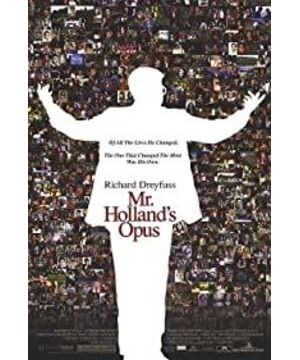CCTV-6 Commentary on the translation of "Mr. Holland's Movement" (full text, abridged)
Nine years On January 17th, CCTV-6 "A Date with a Good Movie" broadcast the American film "Mr. Holland's Opus". Since some film and television dubbing fans and I have translated this film for our own entertainment, I am very familiar with the English lines of the original film. When I listened to CCTV's Chinese dubbing, I was immediately speechless, and many of the low-level or unintelligible translation errors were simply unbelievable (for example, there were only two references to the famous Beatles in the film, CCTV-6 version one One place is Bayless and another is Butters!) Even a junior high school student would never be absurd if they looked up dictionaries carefully. For this reason, I spent more than a month on China Dub Online posting long posts one after another, commenting on the fallacies. In 2009, I reposted a part of it to my QQ space, but there was almost no one there... So according to the suggestion of a certain children's shoes, on the occasion of the ninth anniversary, I will select a part of it and transfer it to Renren.com to let teachers and classmates. They also saw the "masterpiece" of CCTV that year.
Explanation: The one marked with 1 in front of the Chinese translation is the translation of the 6th edition, and the one marked with 2 is our translation (the part in parentheses is the literal translation I indicated). No number is not objectionable or can be omitted.
Fragment 8
Huo: Um, Miss -- I'm sorry.
Lan: Lang. Lan.
Huo: Pardon me? What?
Lan: Lang, Gertrude Lang. Lan. Gertrude Lan.
Huo: Okay, Miss Lang. Um, would you take it from bar 37, please?
1. All right. Miss Gertrude, would you please play bar 37 by yourself?
2. OK. Miss Lan. Well, please blow it alone, starting at bar 37.
. . . . . .
Huo: Miss Lang. Would you mind hanging for a movement, please? You seem to be having a little trouble getting through the break.
1. Miss Gertrude, can you leave later? There's something wrong with your pauses in your performance.
2. Miss Lan. Would you please stay for a while? You're having trouble with the sudden change of scales.
Comments: ① The translation of Yang 6 strangely translates the titles of several characters in the film into Mr. /Mrs./ Miss + fist name. Like Miss Gertrude here, this is not in line with the habit of addressing Westerners (not in line with the original text). ), and it doesn't match the mouth shape.
② "from bar 37" is not just this measure.
③ The keyword break here means the connection point of different sound areas of high and low, rather than a pause. In fact, Miss Lan's problem in the film is that she often blows the low pitch up or down the high pitch.
Fragment 9
Huo: This tests are pathetic. “Name an American composer.” Miss Swedlin, your answer was?
1. This test is sad. "Write the name of an American composer." Miss Winston, your answer?
2. The results of this test are very sad. "Write the name of an American composer." Miss Swelling, your answer?
Girl: Bach? Bach?
Huo: Johann Sebastian Bach. Oh, this-- This is my favorite one. \"How do you know what key a concerto is in?\"Mr. Mims, your answer was: \"Look on the front page? -- Question mark.\" Now, this question mark-- was that because you weren't sure or because your English skills are on the same level as your musical theory? These tests are a waste of my time and yours!
1. Zhuo Ann Stabst Bach. I like Bach very much, but he is German. Let's look at this again: "Do you know what the elements of a concerto are?" Miss Mim, your answer is: look at the front page of the score, and there is a question mark. The question mark is because you can't be sure? Or is it because your English skills are as bad as music theory? You papers are wasting your and my time!
2. Johann Sebastian Bach. Oh this. This is what I appreciate the most. "How do you know, a concerto, its mode?" Mr. Mings, your answer is: look at the cover of the score - question mark. So, the question mark means you're not sure yet? Or that your language skills are as bad as your musical knowledge? This is just a waste of my time and yours!
Sullivan (to Mings): No kidding. I\'d rather be some where else.
1. Stop making fun of people, I'd rather go outside.
2. Seriously. Wish I was somewhere else.
Huo: . . . As for the rest of you, get your textbooks out. We\'re gonna go over these answers one by one until you get them right!
1. To understand all the questions!
2. For the rest of the people, take out your textbooks, and I will answer the questions again, one question at a time, until you all understand!
Comments: ① The pronunciation of the German name Johann is different from that of English John, so Holland did not explain much in the original film. But the translation into Chinese is afraid that people who are not familiar with music will not understand, so Yang 6's "liar" is understandable, but it is completely wrong to pronounce Johann as Zhuo En (just like we can't pronounce Beethoven as Beethoven) It is a reason), and it is even more inexplicable to translate Sebastian into Stabst. A famous giant like Bach must have a standard translation name. If the translators are not familiar with it, they will be too lazy to check. Check the information? In addition, it can be seen that the translator of the 6th edition mistakenly thought the sentence "This is my favorite one." was the Bach of the previous sentence (so it was translated as "I like Bach very much"), but in fact this sentence is Horan quipped that Mings' answer was his "favorite".
②The keyword Key here means mode, not element.
③The so-called "Miss Mim", there is a close-up shot in the film, that is a boy sitting next to Sullivan! The translation is wrong, didn't the director and actors notice the picture?
④No kidding means (I) don't joke, not (you) don't make fun of people.
⑤ The key sentence get your textbooks out. It means to take out your books, not take out the books.
Fragment 10
Lan: … I just… I just want to be good at something. My sister's got a ballet scholarship to go to Juilliard.…
1. ...I just want to play the clarinet well. My sister received a ballet scholarship at Joulet School; …
2. …I just want, just want to have a specialty. My sister entered Julliard with a ballet professional scholarship;…
Comment: ①I just want to be good at something.
②Julliard is a world-renowned music institution, with preparatory courses from primary and secondary schools (approximately equivalent to our attached primary school) to a doctorate degree Full-time education, China's general standard translation is the Juilliard School of Music. In the translation of CCTV-6, such proper nouns are often translated indiscriminately.
Fragment 11
Principal: . . . Perhaps you should be our track coach.
1. Maybe you should be our track coach.
2. Maybe you should be our track coach.
Comment: The keyword track here means track events, not trucks. I doubt if the word track and field was in the film, they would translate to trucks and fields.
Fragment 12
Huo: Let's take our seats, please. Anybody here know the difference between the Ionian and the Dorian scale? Anybody? (laughs) I just wanted to confirm the fact that I've made absolutely no Impact on you in the last five months.
1. Please take a seat. Can anyone tell me the difference between "la" and "multi" scales? who said? I'm just wondering if my teaching has had a noticeable effect in the past five months?
2. Please be seated. Who can tell the difference between Ionic and Doric scales? Who? I just wanted to state the fact that all my efforts over the past five months have been in vain for you.
. . . . . .
Huo: Wrong. That was “Minuet in G.” And it was written by Johann Sebastian Bach. You hear it?
And he wrote it in 1725. They are both prime examples of the Ionian scale.
1. wrong. This is a Minuet in G minor. The author is Dorne Starbuster Bach. Did you hear it? This piece, written in 1725, is the best example of a "pull" scale as the main note.
2. wrong. Minuet in G major. The composer is Johann Sebastian Bach. Did you hear it? This is what he wrote in 1725. This piece is a typical Ionian scale.
Comments : ①Key sentence I just wanted to confirm the fact that I've made absolutely no Impact on you in the last five months. and Dorian scales, I checked a lot of information, but I didn't find a clear explanation about the definition of music in the English dictionary; but I learned from music books that this was borrowed from ancient Greek before Western music entered the major and minor scale system. Give the names of scales with a dominant C (poly) tone and scales with a dominant D (come) tone. These two words are too professional, and maybe people who have not studied music history systematically will not know (the original film used this to show that what Holland taught in the first five months of music class was too boring), but a little knowledge of music theory People should not be mistaken: the former corresponds to the major scale, and the latter corresponds to the minor scale (both with "la" as the main tone); as a translator, it is even more necessary to translate randomly without checking the information. The translation of Yang 6 just confuses the two. As for "Minuet in G.", which is the most popular and most widely circulated among Bach's minuets, the mistake of Yang 6 may surprise many piano children. In fact, whether the song is in a major or a minor key, that is, whether it is "multi" or "la" is the main sound, just hum a few sentences along with the song to find out. . .
Episode 13
Howe: And their hands were up in the air and they were answering questions. And it was so much fun. It was rowdy, you know. It was… It was just great (laughs). Hey, hey, hey. Let … What do we think, huh?
1. The children raised their hands and they answered the question. The class was really fun and the atmosphere in the class was very lively. Ah, this bed is awesome. Hey, hey, what do you think of this bed?
2. They raised their hands and rushed to answer questions. They were very active. It was really enjoyable, really. . . It's amazing (laughs)! Hey, hey, hey, what about this bed, eh?
Alice: And it only took two tries and three hours.
1. It took two people three hours to install it.
2. And only tried it twice but it took three hours.
. . . . . .
Huo: If we used our savings account we could and I taught driver's ed during the summer.
1. If we use our savings we can pay for the house. Don't forget I've been substituting this summer.
2. It is enough to withdraw the money. I will be a driving instructor again in the summer vacation.
Ai: You were gonna only compose this summer.
1. You wanted to compose music this summer.
2. But you still have to compose music during the summer vacation.
Huo: Well, we could make it work.
1. We should work hard.
2. Ah, there will be no conflict.
Comments: ① The key sentence It was just great. It is about the class at the front, not the bed at the back.
②Keyword two tries Literally translated as tried twice, not two people. And the meaning of this sentence is that it didn't take much time and energy. CCTV's translation means that it took a lot of time and energy.
③The key sentence I taught driver's ed during the summer. In fact, in the film, Holland has been using the vacation as a driving instructor to earn money to subsidize the family, rather than any substitute.
④The keyword make it work. Literally translates to make things work properly, not work hard.
Fragment 14
Lan: . . . I'm just… I'm just goofing everybody else up anyway. . .
1. I always let others get it wrong.
2. I'll just slow everyone down (I'll just mess everyone else up anyway).
. . . . . .
Huo: . . . (playing record) These guys, for example. Now, they can't sing. And they have absolutely no harmonic sense. . .
1 Like you hear these people now, they can't sing anymore. They are clearly incapable of cooperating.
2 You come... listen to them, they... can't sing, and they have no concept of harmony at all.
. . . . . .
Huo: . . . Pick up your clarinet and play with me.
1. Pick up the clarinet and play it for me.
2. Pick up the clarinet and play with me.
Lan: Okay.
1. What?
2. OK.
Huo: And this time no music.
1. No music this time.
2. This time, no sheet music.
Lan: (stacks) Oh, I…
1. I, I don't know. . .
2. Ah I. . .
Huo: Because you already know it. It's already in your head and your fingers and your heart. You just don't trust yourself to know that.
1. No, you already know that. This music comes from your head, on your fingers, in your heart, you just lack confidence.
2. Because you've already memorized it, it's already in your head, between your fingers, and in your heart, you just don't have the confidence, understand?
Comments: ①The key sentence Now, they can't sing. And they have absolutely no harmonic sense. (There are many mistakes in translating the modal particle like now into a real word in the whole film)
②Keyword music. In addition to music, it can also refer to music and sheet music. I am afraid that only junior high school students or even elementary school students will see a word and translate it according to its first meaning. In the film, Horan took Miss Lan's music stand and music score when he said this.
③The last sentence, how can other people's music "come from your mind"? Is it a habit of plagiarism?
Fragment 15
President Johnson (Voiceover): I do not find it easy to send the flower of our youth, our finest young men, into battle. But as long as there are men who hate and destroy, we must have the courage to resist. We will stand in Vietnam.
1 I know it will not be an easy task to send our young men, our best young men in America, to the battlefield.
2 I know that it takes a lot of determination to send our young and prosperous children to the battlefield. But as long as there are haters and peacebreakers in this world, we must muster the courage to fight. We will never retreat from Vietnam.
Comment: The story of the film spans 31 years, and each episode is connected by audio-visual materials of some major historical events in the United States at that time. For example, the voice-over of the then-US President's speech and the subsequent sound of the helicopter were added here. But unlike most of the other transitional passages, there are no pictures of historical events at the time inserted here, and the entire scene is the school's graduation ceremony (including the student band playing and the issuance of the diploma). I don't know why the last two sentences were not translated in the Central 6 version, but obviously in the absence of pictures, the key sentence to explain the time here is "We will stand in Vietnam." Without this sentence, the original film is concise and smooth. The art of cohesion is broken, and the audience may be confused. It would be better not to translate the whole paragraph. (Similar to here, the time is told by a voiceover from the radio news at the beginning of the film - the key phrase is "On the nearly one-year anniversary of the assassination of President Kennedy...")
Fragment 18 (two people playing chess)
. . . . . .
plum:. . . It's not about wrestling. I care about the kid.
1. Well, let's not talk about wrestling. I will take care of him.
2. Wrestling aside, I care about him!
Mei: I was kept off the chess team, and, well, It's ruined my life.
1. I was forced to leave the chess team, it ruined my life.
2. The chess team doesn't want me, so I keep losing.
Comments: ①The key sentence It's not about wrestling. I care about the kid. Literally translated as "It's not about wrestling. I care about the kid.
②I was kept off the chess team, and, well, It's ruined my life. This is a joke that Meester wanted to lighten up after arguing with Holland. The translation of the 6th edition of the central government seems to be correct, but it is actually a big mistake.
Fragment 19
Horan: He couldn't hear. Of all people. Not a thing. And because Beethoven couldn't hear, the thought of him conducting----or let alone composing---- was pathetic to most people. …– and the orchestra in his mind is playing perfectly. And the orchestra In front of him trying desperately just to keep up.
1. He can’t hear, maybe it doesn’t matter to others, but because Beethoven listens Without it, he would not be able to direct, let alone compose music. This made everyone very sad. In response, Beethoven composed and conducted the Seventh Symphony. Imagine Beethoven standing on the podium with his baton in hand, his hands dancing gracefully in the air, and the orchestra playing perfectly as he asked. The band around him tried their best to keep up with him.
2. He can't hear. Among all mankind, it is him. Because Beethoven can't hear, not only composing, but also conducting, most people think it is impossible. In response to these people, he composed the Seventh Symphony and conducted the performance himself. You imagine, Beethoven... standing on the podium, holding the baton in his hand, his hand waving gracefully in the air, in his imagination... the orchestra cooperates tacitly. However, the band members were actually trying desperately to keep up with him.
Comments: ②The keyword pathetic means hopeless success, not another meaning sad.
③The keyword in his mind means in his imagination. Missing this phrase, the Central 6 version just translates the meaning backwards (the original uses two opposite phrases "the band in his head" and "the band in front of him" meaning he imagined the band to play perfectly but it wasn't) and The translation of the 6th edition of the central language itself contradicts itself.
Fragment 20
. . . . . .
Huo: That gestures meant that Cole would never learn how to lip-read or to talk!
1. But using gestures meant that Cole would never learn how to lip-read or to talk!
2. Gestures will keep Kaul never lip-reading or speaking!
. . . . . .
Oh, he's a specialist who thinks that deaf people are retarded and he is not retarded; he's…
1. He's a specialist who thinks that deaf people should be delayed, Cole can't afford to delay! . . .
2. Oh, that expert sees deaf people as mentally handicapped, but Kaur is not mentally handicapped! . . .
Comments: ① The keyword lip-read means lip-reading—that is, the deaf-mute person reads out the content of his speech by observing the mouth shape of a normal person, rather than reciting it with his own mouth.
②The keyword retarded means mentally retarded, not delayed.
Fragment 21
Huo: So, who was Bach writing all this for? Mr. Tidd, care to join us?
1. Well, who was Bach writing all this for? Mr. Ted, pay attention.
2. So, for whom were these works of Bach written? Mr. Ted, can you tell us?
. . . . . .
Huo: . . . Stadler. You stoned again, Stadler?
1. Stadler, are you jealous again?
2. Styler, pretentious again?
. . . . . .
Huo: . . . I want a paper on my desk by the end of term. I want it to be single-spaced; I want it to be annotated.
1. I want you to hand me a piece of music at the end of the term. My requirement is monosyllabic, with annotations.
2. Write a paper for me at the end of the semester. More than 2,000 words (typed without blank lines), and comments are also required.
. . .
Huo: Watch me!
1. Watch me!
2. Behold!
Comments: ① The key sentence care to join us? Literally translates as "Do you want to join us?" (The next is Ted's answer to the question, if according to the translation of Yang 6, Ted should not speak or just say "yes" is enough )
②The key word stoned. means drunken, flirtatious, not jealous. In fact, Stoned is mocking another boy, and thinks he doesn't need to take music lessons at all - he knows it all. So later Horan taught him a lesson in life.
③The keyword paper means a paper, not a musical work.
④Keywords single-spaced. It means that there is no blank line between typing lines. It is incredible that the 6th edition of the Central Committee is actually translated into a single syllable—there are syllables in musical works? If it is text, what does it mean to ask for a single syllable? Is every word monosyllable? Or is the whole article just one syllable? (I am not familiar with secondary education in the United States. According to the original text, it is estimated that their composition does not require the length of words, but requires one or two pages according to the number of pages. Of course, if you type without a blank line, the length will be doubled. Therefore, I At that time, it was translated as "more than 2,000 words")
⑤ "Watch me!" means "wait and see" rather than "watch me" (the latter words are "you won't pass the essay if you don't submit it")
Fragment 22 (Funeral of Louie Voss)
. . . . . .
Huo: . . . He made the state wrestling finals three years running. . . .
1. He once won the first place in the state boxing competition three years in a row.
2. He reached the state wrestling final three years in a row.
Comments: ① The keyword wrestling is wrestling rather than boxing. In addition, it was mentioned in the previous film that Voss is good at wrestling (see clip 18), but such a big loophole actually passed seven or eight levels of translation, proofreading, directing, matching, recording, combining, and reviewing!
②Keyword finals. It means final, not first.
Fragment 24
. . . . . .
Sarah: A George and Ira Gershwin revue with very few costumes, one set…
1. A George and Ira Gershwin revue. No need for much clothing, one set. . .
2. A Gershwin Brothers musical can be performed with very few costumes. . .
. . . . . .
Meester: (overlaps) Excuse… Excuse me, Gene.
1. Excuse me, Greene, please excuse me.
2. Listen to me, listen to me, Gene.
. . . . . .
Comments: ① Keywords Ira Gershwin, (Ira Gershwin), lyricist, brother of the famous composer George Gershwin. The brothers have collaborated on many musicals and hit songs.
②The keyword Gene (Gene) is the name of Mr. Waters (the former vice-principal and now the principal) who presided over the meeting. In fact, Meester was going to speak to Waters, but the 6th edition of the Central Committee inexplicably said " Green" (which is their translation of the protagonist Holland's name Glenn, which is also incorrect).
Fragment 26
Horan: Hey. How was the science fair? (to Kaur) You want to go to the what?
1. Ah, how was the science fair? See the stars?
2. Hey, how's the science fair? Where do you want to go?
Alice: Stars. Cole discovered astronomy tonight.
1. Cole is going to make an astronomy observation tonight.
2. Other planets. Kaul discovered astronomy tonight.
Huo: Whoa. Whoa. Slow down. Slow down. You're goin' like a rocket.
1. Oh, slow down, slow down, you're about to become a rocket yourself.
2. Oh, oh, slow down, slow down, you move like a rocket.
. . . . . .
Comments: ① I don't know how the phrase "Look at the stars" in the 6th edition of the Central Committee was translated? It must have been translated according to the original script, but the sentence "You want to go to the what?" was omitted, but Alice's "Stars." was added to Holland's head and mistranslated as "Look at the stars".
② The key sentence Cole discovered astronomy tonight. The verb discover is to discover rather than observe, and it is past tense rather than future tense.
Fragment 27
. . . . . .
Huo: This song is wistful, Miss Morgan. It's about a woman who is alone in a very, very cold world and all she wants more than anything is to have someone hold her close and to tell her that everything's gonna be all right. It's about the need for love in your gut. Okay? Try it again, from the top. This time I wanna do it in a lower key.
1. This song is full of longing, Miss Morgan. It's about a woman who is alone in a cold world and all she wants is someone to come close to her and tell her that everything will be ok. This song expresses the need for love. Use your intuition. okay? Then we'll start all over again. Down one key this time.
2. This song is full of expectations, Miss Morgan. It's about a lonely girl in a very cold world, and her only wish is... expecting someone to come to her and tell her that everything will be fine. It was a...heart...longing for love. understand? One more time, from the beginning. Down one key this time.
Comment: The keyword in your gut. Gut means internal organs, content, etc., in you gut should be in the depths of the heart, from the heart. And can acting and singing be "intuitive"?
Fragment 29
Horan: Well, he's making a bigger mess than he already has! This is off-limits, Cole. Do you understand? Don't touch.
1. Forget it, he's causing more trouble than he already has Big! It's forbidden to enter here, you know? do you understand? Don't touch it!
2. Come on, he's getting more and more helpful! Don't touch the scores, Kaur. do you understand? Don't touch them!
Alice: That's "don't sit."
Comments: ① The keyword off-limits. The original meaning is "(some occasions) restricting a certain type of people from entering." For example, my country stipulates that Internet cafes are "off-limits" for primary and secondary school students. But here in the film, Kaur helps his father Holland to clean up the sheet music that fell to the ground on the floor of his own house, so it is obvious that Holland means "(music sheet) This thing is not allowed to be touched", Central 6th edition Copying the dictionary into "no entry" not only makes the audience "Zhang Er monk", I am afraid that the translator himself can't figure it out.
Fragment 31
(Holland playing piano)
Alice: Who's Rowena?
1. Who's Rowena?
2. Who is Rowena?
Horan: Huh? Huh?
Ai: Who's Rowena?
1. Rowena, who is Rowena?
2. Who is Rowena?
Huo: Uh… A legend. A heroine from Norse mythology. I got a book about it some where around here.
1. A legend, a heroine in Norse mythology. I also read it from a book.
2. Ah, ah, that is, a fairy in Norse mythology, I have a book here... about her.
. . . . . .
Comments: ①There is an important text picture in the original film. The 6th version of the original film has no translated subtitles (there are some unimportant text and pictures in the 6th version with subtitles), that is, the score played by Holland has a close-up Shot, the title of the piece is "Rowena's Theme" ("Rowena's Song"). This title is very important for the audience to understand the plot, because at this time, both Horan and Rowena had a subtle love for each other, but neither made any confessions or hints. Horan just writes that emotion into this beautiful and moving little piece. This title does not have Chinese subtitles, which will make it difficult for viewers who do not understand English (or do not know that "Rowena" is "Rowena") to see the "wonderful writing" of the original film director. (Later Alice noticed this hidden relationship, and also saw the name of Rowena who was performing from the program list - only then did she match the number with "Norwegian Mythology Fairy").
Fragment 32
. . . . . .
Rowena: If I wait, I'll never do it. I'll end up waiting tables or working in some store. It has to be now. You could come with me. I know you think I'm just a kid. I know you're married and you have a son.
1. If I wait any longer, I will not leave. I will quit my job at the store. Must go now. You should go with me. I know, you treat me as a child, I know you are married and have children.
2. If you don't go now, you will never go. I can only stay here as a restaurant waiter (I will be a restaurant waiter or a store clerk for the rest of my life) and must go now. You go with me. I know that you treat me as a child, and I also know that you are married and have children...
. . . . . .
Comment: The key sentence I'll end up waiting tables or working in some store. The phrase end up means "to end; to end; to die", not "to resign", Rowena is still in school and doesn't work in the store at all, how come Inexplicably "resigned"?
Episode 1
There's a saying old ...(saying, proverb)
1. The old people say...
2. The old proverb says...
"Seek and ye shall find." (ye [Old English] means you)
1... Seek and ye shall find. The
2...the pursuit will get you
...I've had in mind.
1...I've been thinking
2...The
only
man I ever think of with regret.
1. This is the only person I ever think of with regret
2. The only one in my heart, (can't find him) I will always regret
...
I hope that he turns out to be
Someone who'll watch over me.
1. I hope he will show up,
someone will watch over me
2. I hope he will be someone who
can take care of me
...
I know I could always be good
To one who'll watch over me.
1 . i know i always have good luck
someone will watch
me of as handsome, 1. Although he is not the man, some girls think, he is a handsome man 2. Although he may not be the handsome man in the heart of some girls To my heart he carries the key. 1. In my heart he brings the key Come to the sky (translator takes the key-key as sky-sky?) 2. But he holds the key to open my heart Won't you tell him please to put on some speed, Follow my lead. . . . 1. Please don't tell him, speed up and follow me. . . 2. Please let him speed up as I wish. . .
. . . Oh, how I need
Someone to watch over me.
1. . . Oh, how I need
someone watching me.
2 . . . Oh how I need
someone care of me.
Comment: This is a very beautiful song by the Gershwin brothers. And very cleverly, as if it was written for this film, this song is very relevant to the mood of Rowena who sang it, and the only man in her mind is Mr. Holland (more seamless Yes, the actor of Horan in the film is a short and unremarkable man). So even though it's not an original movie song or lines, this song is more closely related to the film than many original movie songs. However, the translation of many of the lyrics in the Central 6th edition is simply incomprehensible. When I was transcribing the translated words of the 6th edition, I couldn't help but blush and heartbeat every time I saw it - how dare you type this translation? "We can't afford to lose this man!"
Fragment 33
. . . . . .
Female Announcer (Voiceover): The spirit of the Beatles is dead tonight at the age of 40.
1 Dion Lennon was killed tonight at the age of forty.
2 The soul of the "Beatles" was killed tonight at the age of forty.
Male Announcer (Voiceover): The mood was silence and reverence at the appointed hour of 11:00. But as the crowd continued singing the Beatles' songs – the songs of John Lennon – they became happier, vibrant more spirited. That was the purpose of John Lenon's music and his life.
At O'Bryan Square In southwest Portland, this Is Jim Collins reporting.
1. At eleven o'clock in the morning, the atmosphere at the memorial service was dull and solemn. But when people sang Dion Lennon's songs and Bayless' songs, they became more excited and more spirited. This is the meaning of Dion Lennon's life and his music.
2. The atmosphere was solemn and solemn at the memorial service at 11 o'clock today, but when people sang Lennon's "The Beatles" song, they became lightened and refreshed. That's what Dion Lennon's music and his life are about. Jim Cosling reports to you from O'Brien Square in Portland.
Comment: Keyword Beatles. Obviously, the translator of the 6th edition did not know the Beatles (the Beatles or "The Beatles"), which became popular in Europe and the United States in the 1960s and 1970s. The first sentence is not translated, but the latter sentence is actually translated into Bayless and juxtaposed with Lennon (here the song of John Lennon is the attribute of the previous Beatles'songs). It can be seen that the translators of the 6th edition of the film are not only poor in English and Chinese, but also have a poor understanding of Western culture. Therefore, we can say without extremes that the translators of this film do not possess the level of knowledge in all aspects required for a competent translation.
Fragment 35
. . . . . .
Alice: ...(translating Kaul's sign language): Why do you assume that John Lennon's death would mean nothing to me? Do you think I'm stupid? I know who John Lennon is…
1. Why do you think John Lennon's death means nothing to me? Do you think I'm stupid? I know who he is. . .
2. Do you think Lennon's death means nothing to me? You think I'm stupid? I know Dion Lennon. . .
. . . . . .
Ai (translation): You must think so. If you think I don't know who the Beatles are or any music at all. You think I don't care about what it is that you do or what you love? You're my father. I know what music is. You could help me to know it better, but … no. You care more about teaching other people than you do about me.
1. If you think I don't know Butters or that I don't know music at all, then you think I'm stupid. You think I don't care about the work you do and love. You are my father. I know what music is. You should have helped me a lot with this, but you didn't. You teach others more than you teach me.
2. You must be thinking, you don't think I know "The Beatles" or any music. Do you think I don't care about your work, your career? You are my father. I know what music is. You could have let me know more...but you didn't. You only have your students in your heart and not me.
Comments: ① Note that the reading of John Lennon in these paragraphs of the Central 6th edition is not uniform (one reads Zhuo En, and then John).
②The key word Beatles is also wrongly translated. What is even more incredible is that this paragraph is only a few minutes away from segment 33, but Beatles was previously translated as Bayles, and here it is translated as Butters!
Episode 2
. . . . . .
Over the ocean, Sailing away
I can hardly wait to see you come of age
1. Crossing the ocean, sailing far away
I can hardly wait for the day you come back
2. Across the oceans and sails
I can't wait to see you grow up
. . . . . .
Life is what happens to you
While you are busy making other plans
1. Life is accidental
while you are busy with other plans2
.
Life is all those things that happen to you inadvertently while you are busy with your own plans
. . . . . .
Comments: ①The keyword come of age means "to the legal age, adult," rather than "the day to return."
This is a moving song written by John Lennon for his son (the last word boy in the film). Changed to Cole). Like Gershwin's song, this song seems to be specially composed for the film, and it fits the plot very well: after being censured by his son, Horan stayed up all night, and then tried every means to help Cole and other deaf mute. The students held a special concert. At the end of the concert, Holland himself sang this Lennon song to express his feelings for his son. Father and son loved each other as deeply as ever.
Fragment 36
. . . . . .
Michael: . . . We've done all we can.
1. . . We are doing our best to make this happen.
2 . . . We have worked hard.
Horan: Then, do it again. That's what I used to tell you when you were my student Michael and it served you pretty well then.
1. But still, I told you this when you were my student, Michelle.
2. Try again. I taught you that when you were a student, Michael. Try again (and it will work for you then).
. . .
Huo: I don't think the time was that different; I think that more was expected us.
1. I don't think the times are different. I think we should expect more.
2. What makes a difference is that people expect more from educators (us).
. . .
Mai: I resent your tone, Mr.Holland. And I don't think you have any real appreciation for our financial problems.
1. I am not satisfied with the way you speak, Mr. Holland. I don't think you are qualified to comment on our financial issues.
2. I disagree with your accusation, Mr. Holland. Why don't you consider our financial difficulties at all? (I don't think you have any objective assessment of our financial difficulties.)
. . . . . .
Comments: ①The key sentence Then, do it again.
②Keyword Michael, it is very strange why the 6th edition of the Central Bank mistranslated so many people's names? Translation, director, and actor do not listen to the original sound? Don't look up the dictionary? A name as commonly used as Michael is mistranslated. Will they translate Michael Jordan as Michael Jordan next time?
③The key sentence more was expected us. It means that there are more expectations for us, not that we expect more.
④The key sentence I don't think you have any real appreciation for our financial problems. (real appreciation means "a true and correct evaluation", rather than being unqualified to comment.)
Fragment 37
Alice (reading Kaur's letter): "A very flattering offer has been made to me to teach at a university for the deaf In Washington, DC I'm not sure that I'm going to take it because I'm fond of the students In the school that I'm at now . It's something to think about. No girlfriends yet – at least not serious ones. And tell Dad that I'm never going to give his car back. Love always, Cole.”
1. Very happy to receive an offer to teach deaf students at a university in Washington DC, I am not sure I will accept this job because I really like the students at the school where I am teaching. There are many things to consider. I still don't have a girlfriend, at least not a real girlfriend. Tell Dad I'm not going to drive his car back. Always love your Cola.
2. I am delighted to receive an invitation to a school, a deaf college in Washington, DC, and I have not made a final decision yet, because I really like the students at the school where I am teaching. But it's worth considering. No girlfriend yet, at least no real girlfriend yet. Tell Dad I'm not going to give him that car back. Love you guys... Kaur.
Comments: ①Washington, DC It is very irregular that the DC here is not translated into Chinese. Moreover, 1.3 billion compatriots probably say that 1.2 billion do not know what Washington DC means (probably the translator does not know and will not translate).
②The key sentence It's something to think about. It means that this is one thing to consider, rather than "there are many things to think about".
③ The key sentence give his car back. It means to return his car to him, not "drive his car back" (in fact, the car was returned later, but still not returned).
Fragment 38
(Holland sits alone in an empty music classroom)
Meester (enters): Hey! Hey!
Holland Hey. What are you doin' here?
1. what are you doing?
2. Hey. What are you here for?
Mei: You know, I had some jock straps in the rinse cycle down in the locker room. Come to see if you needed any help.
1. I use the washing machine to wash the knitwear for the players in the locker room. I want to see if you need help.
2. take things. I put the stretch body in the locker room. I'll see if you can help.
. . . . . .
Huo: Too old to start a rock band. Probably hang out a shingle and teach a few piano lessons.
1. I'm too old for rock music, maybe I can just do my own thing, teach piano.
2. I'm too old for a rock band. Can only...post an advertisement to teach piano.
...
Huo: ... I'll tell you the truth. I'm scared to death.
1.. . . . . I'll be honest with you, I'm afraid I'm going to die.
2. . . . . . To be honest, I was scared to death.
. . . . . .
Comments: ① The keyword jock straps means elastic body protectors for male athletes, not knitwear. And the translator of the tense of this sentence did not understand it at all. (Actually, Meister was looking for an excuse to come to see Holland instead of doing things)
② The keyword hang out a shingle means hanging a sign, not "doing your own business".
③I'm scared to death. It means I'm scared to death. The subtext is: After I leave my post as a teacher, I'll be like a lost soul, I don't know what to do in the future; it's not "afraid of death".
Fragment 39
. . . . . .
Gertrude Lan: Mr.Holland had a profound influence on my life. On a lot of lives, I know. And, yet, I get the feeling that he considers a great part of his own life misspent. Rumor had it, he was always working on this symphony of his and this was going to make him famous, rich. Probably both. . . . . . . (The crowd applauds and cheers)
1. I know that Mr. Holland has had a profound impact on my life and the lives of many others. However, I have heard someone say he thinks most of his life was wasted. This is a rumor. He's always composing his symphonies, and that would make him famous, rich, maybe rich and famous. . . . . . . Mr Holland.
2. Mr. Holland has had a great influence on my life.... I think we've all been influenced by him. But he himself might think that most of his life was... in vain. He is said to have been writing symphonies all the time, which could have made him famous, rich, or both. . . . . .
Lan: Mr. Holland, (Mr. Holland here was translated into the previous paragraph by the 6th edition) …… If you will, would you please come up here and take this baton and lead us in the first performance ever of “The American Symphony” by Glenn Holland.
1. ... If you want, please come up on stage, take up the baton, and conduct our first performance of this American symphony orchestra of yours. Mr. Green Holland.
2. Mr. Holland, if you will, please come to the stage and use this baton to lead us to the premiere of the "American Symphony" composed and conducted by Glen Holland.
①The keyword Rumor had it here is related to the creation of his symphony in the next sentence, meaning that it is rumored that he has been creating symphonies; instead of saying that the previous sentence "most of my life wasted" is a rumor.
②The keyword "The American Symphony" refers to the title of the piece "American Symphony", not the name of the band "American Symphony" (the band on stage in the film was taught by Holland for thirty years It is composed of students from different grades).
This is the end of the entire film. To sum up, aside from factors such as the film and screen, there are eight or ninety major mistakes in the pure text only in the translation of the 6th edition of the Central Committee. If these major mistakes are classified again, there are about thirty major mistakes. , in other words, if you make similar mistakes in other industries, it will cause great losses to people's lives and properties! Not only that, but some mistakes are only a little bit by any person involved in the dubbing or reviewing process during the entire dubbing process.” Heart" can be avoided!
Guidance and distribution problems:
1. In addition to the laughter, throat clearing, etc. I mentioned earlier, there are many missing modal particles throughout the film. Such words may not be in the script obtained by the translation (so I put them in the directing problem), but they are not optional in the film, because they play a very important role in conveying the emotions of the characters, and, Most of these words also have clear mouth shapes. Therefore, omission of inappropriateness will also make the film have another discount in the degree of "reduction". To name just three examples:
① When Alice told Holland that she was pregnant, Holland was overwhelmed by not being a little mentally prepared (because it would make life more burdensome for both of them), was speechless, and only said A sound of "Well..." (translation 2: I...), in the 6th edition (translation 1), only the mouth can be heard but the sound is not heard;
②Ai let Huo play the piano after the 13th clip, after Huo played, Ai nodded and said "" Um, hm", in the 6th edition, I can only see the nod but no sound;
③Segment 38 Meister came in to say hello to Holland, and Huo responded with a "Hey", and the 6th edition also saw the mouth but not the sound
2. The Central 6 version misses a lot of group noise, which destroys the authenticity of the translated version. Example:
① In segment 21, when Ted answered Holland's words without question, the original film had students laughing, but the central version 6 was silent here.
② In segment 22, the officer presiding over the funeral said Amen at the end of his speech. In the original film, everyone responded in unison, but the Amen in the central 6 edition was only the voice of Meester.
③ After the performance of Episode 1 ended, Holland and Alice had a brief conversation. At this time, the background was noisy, but the background sound of the 6th version was almost inaudible.
. . . . . .
3. The location of many dubbing in the film is inaccurate, which is also a serious negligence of the dubbing director and actors. In particular, some errors cause the incoordination of the sound and picture of the film and the unreasonable logic. There are also three examples:
① Fragment 5 is the first time Holland conducts a student band. The original film is: After Holland said "start", he then made a commanding action, and then the music sounded; and the central version 6 was composed: The commanding action has already started, and the voice of "Let's start" has not fallen, and the music has already sounded.
② Fragment 17, Holland conducts the rehearsal of the wind band, and shouts "One, two, one, two!"
③ Fragment 32 In the last paragraph of Rowena's last sentence...great music. and The bus..., there is a pause of five or six seconds, and then after finishing the last sentence (the appointed time), she turned and walked away, the pause of the original film It is very reasonable, because the words before and after the pause are not logically connected, and the logical meaning of turning away after speaking is that Luo does not need Huo's answer; and there is almost no pause here in the 6th edition, so the film becomes Luo two. After finishing the sentence, he waited for about six or seven seconds before leaving, which gave people a very strange feeling.
4. The lines of the translated film should not only match the meaning of the lines in the original film, the length of the mouth, but also the movements of the actors (the most typical example is that if the actor stretches out his finger to indicate a number when the lines say it, then The word representing the number in the translated line must also be spoken exactly when the finger is out). Retouching lines like this is also one of the essential tasks of a director. If this work is not done or not done well, it will also make people feel distorted when it comes out. Example:
① At the end of segment 20, Alice hurriedly expresses her painful feelings about not being able to communicate with her son:...I don\'t care what it costs; I don\'t care what the stupid doctor says is right or wrong! I WANT TO TALK TO MY SON! The last sentence is the focus of the whole paragraph, and it is also what Alice shouted out almost hysterically, shaking her hands and stomping her feet. The correct translation would be: No matter how much it costs, no matter what that stupid doctor says, I just have to talk to my son! But the 6th edition of the central bank translates it into: I just want to talk to my son, I, I don't care how much it costs, I don't care what that stupid doctor (note that the former 6th edition translated as doctor and here is translated as doctor) says! Although it means That's right, but the center of gravity is lost. The voice actor's three sentences have the same strength, and the movements of stomping and stomping and shouting hysterically are also out of place with the lines.
② In segment 21, Styler didn't want to listen to Holland's "nonsense" and turned to leave. Holland said: Sit down. You are this close from being suspended, pal. And when saying this close, he made a gesture with his thumb and index finger sew. So a proper voice-over line would be: "Sit down! You almost got suspended, buddy." That way "nearly" just happens to be in sync with the gesture. And the translation of the 6th edition of the central bank is: "You sit down! You are about to be suspended, you know, buddy?" With such a match, the "this close" gesture seems very strange.
③ In Fragment 34, Holland spells the ten letters of John Lennon in sign language, while saying these two words to Kaur, saying John when spelling the fourth letter, and Lennon when spelling the last letter. Logic; but the dubbing of the 6th edition turned into only four or five letters, and John Lennon (note that John did not say Dawn here) has finished speaking!
5. The tone and tone of many passages and lines in the dubbing of the 6th edition of the central film are quite different from the characters and emotions of the characters in the original film. Example:
① Fragment 4 is Holland's first class after becoming a teacher. In the original film, Holland's performance at this time is a bland scripted tone, because being a teacher is an expedient measure for him, and he It's overkill; and the tone of Holland in the 6th edition here is stammering, nervous, and even a little timid, which is far from the emotions of the characters in the original film.
② Fragment 6 The conversation between Waters and two girls. In the original film, Waters spoke in a rigid, routine but indisputable and indistinguishable tone, which appropriately demonstrated his status as a vice-principal and his Consistent work style; however, the 6th edition of the Central Committee has made this sentence a very severe tone, which is very inconsistent with the identity of the characters in the original film and their distinct personalities.
③ In the original film, Alice is a gentle woman. Except for the last paragraph of the segment 20, there is no high-pitched voice in the whole film. However, there are many lines of Ai in clip 26, and the dubbing of the central 6 version is like Ai making a big noise.
Recording problems:
① The original film has many sound effects, which disappeared in the dubbed version of Yang 6. The most obvious example is clip 40. Alice is speaking on the stage. Gertrude and other people push the door into the school hall and stride towards the stage. The sound of the door opening and footsteps in the original film is very clear, while in the 6th version, only Alice is speaking. , the sound is completely gone.
② Between segments 19 and 20, under the background of John Lennon's "Imagine" singing, is a set of historical audio-visual materials. Among them are Martin Luther King's famous speech "I have a dream"; Bobby Kennedy, the younger brother of President John F. Kennedy; NASA officials reporting rocket liftoff; and the first human landing on the moon A famous quote from a man named Armstrong on the moon. Because these four paragraphs are real data, it goes without saying that the sound in the original film is different, they all have strong electro-acoustic effects, and they fade in and out. But in the Central 6 edition, we heard four unrelated words spoken by one person without any electroacoustic effects. For the dignified radio, television and movie channels, the recording equipment for dubbing and filming should be useless, but for electronic sound, fade in and fade out, etc. (when we use home video recorders to record, we often find a soda can for audio recording. What about the sound effects!) Even if you don't want to do it, the translation film can be regarded as a "realm" of unscrupulousness?
Before concluding this article, I would like to say a few more words about my personal views on translated films: I think a translation is good or bad, translation is the foundation, and the director is the key (especially for the current "high-efficiency" translations) .
The so-called foundation is because if the translation is wrong, everything is wrong, then no matter how good the dubbing is, it can only be in the opposite direction, deceiving people to be "better". (For example, the sixth version of the film translates Beatles into Bayless and Butters. For directors and actors who do not know English or know "The Beatles", they can only be "deceived") .
The so-called key is because in the "high-efficiency" translation work, it is already an unrealistic "luxury" for the actors to repeatedly familiarize themselves with the details of the film, carefully analyze the psychology of the characters, and carefully chew the connotation of the lines. The film has been dubbed well, and these tasks cannot be avoided, so this burden should be borne by the director. In fact, for a good professional voice actor, they should be able to do what the director requires.
If the director also understands foreign languages, he can undertake or participate in the polishing of the lines according to the details of the film (of course, this work can also be undertaken by translators or other professionals - of course, whoever does it must be competent and responsible. Not just to "gain points"), it would be more ideal. Because no matter how good the text translation is, it is impossible to translate every detail if you don't carefully check and polish the lines of the film. Here’s a counter-example of my own: In segment 23, the headmistress gave Holland a gift before she retired. I’m relatively slow, and I thought it was a pocket watch after reading it many times, but when we dubbed the whole film and synthesized it Well, after watching the movie again, I suddenly realized that it was actually a Compass! At this point, I suddenly realized this wonderful detail of the original film's director's design, and then I thought of the words of the principal in the 11th sequel - if there is no such detail, our translation is of course good, but if this detail of the original film is to be taken into account. "Restore", then the word "compass" must be clearly stated in the translation!
Of course, I don't mean to say that actors are not important. In fact, "outside the poem" kung fu is also essential for a good voice actor. According to the director's request, the lines on the translation are aligned with the mouth shape, which can only be the basic requirement for the voice actor. When dubbing, helping the translator and director to correct some illogical or unspeakable or unspoken lines should also be the responsibility of the dubbing actor. For example, the above-mentioned "no music this time" in segment 14, "no entry here" in segment 29, etc., and so on, the actors are also to blame.
(End of full text)
View more about Mr. Holland's Opus reviews











